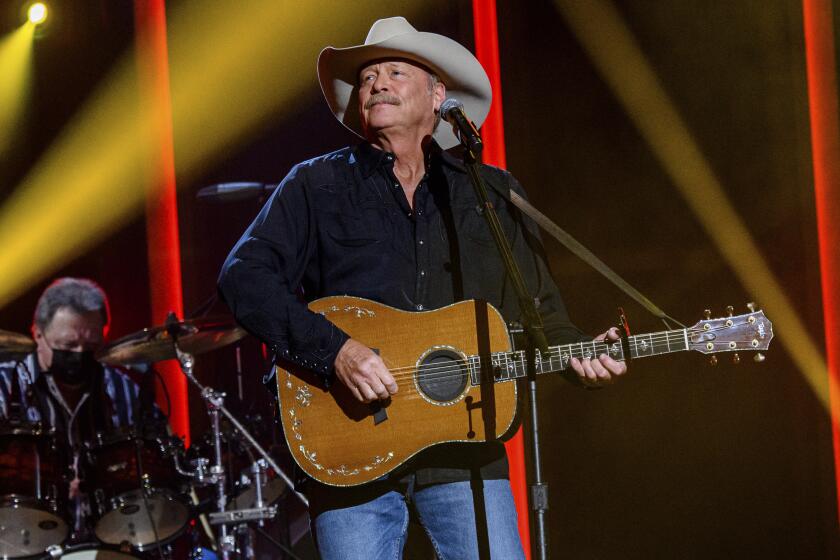Spiritual Rocker Doesn’t Aim to Preach : Music: There’s no reason Rick Elias should be heard only in some Amen Corner of the pop universe. His perspective is too deeply personal and individualistic to conform to any stereotype.
- Share via
FOUNTAIN VALLEY — Rick Elias sat in his living room, reciting a litany that could be a prayer, or perhaps a curse, for the creatively dead.
“Real conservative, easy-listening pop; the least offensive,” said the tall, craggy-faced singer, lining up the pejorative adjectives as he set forth his definition of the stereotypical Christian pop performer. “Hyper-evangelistic, dogmatic, preachy. All the typical epithets hurled at Christian artists, and rightly so, most of the time.”
Like musty cobwebs covering a valuable canvas, the widely held notion (at least among secular rock fans) of Christian music as preachy or blandly reverential pulpit pop could cause many people to unjustly overlook Elias’ artistically vibrant brand of rock.
The 35-year-old rocker’s exceptional debut album, “Rick Elias and the Confessions,” has a decidedly Christian perspective, and it bears the imprint of Alarma Records, a Santa Ana-based independent rock label geared primarily toward the Christian market. But Elias’ perspective is too deeply personal and individualistic to conform to any stereotype. There is no smugness in his spirituality--the songs are full of yearning and doubt, leading to hard-won moments of illumination. That illumination, Elias makes clear, can’t come from authority figures, like big-name televangelists, or from trite icons, like the fundamentalist billboard he dismisses in this ironic couplet from the song “Riot (Comin’ On)”:
And while “Jesus Saves” flickers on and off through the night
We’re stumbling through the dark to find a little light.
“I don’t aim to preach to the converted,” said Elias, who plays tonight at Knott’s Berry Farm on a program of Christian pop performers. “I don’t aim to preach, period.”
When Elias and his band, which includes his wife, Linda, on keyboards, leave next month for a tour of the Midwest, they will be playing mainly at Christian liberal arts colleges. But there is no reason their music should be heard only in some Amen Corner of the pop universe. In its lyrical thrust, “Rick Elias and the Confessions” resembles such spiritually driven rockers as the Call, U2 and Van Morrison, performers whose music is informed by Christian beliefs without being segregated as “Christian pop.” Elias puts across his ideas in an authoritative rock ‘n’ roll voice that carries echoes of Bob Dylan, Bruce Springsteen, and raspy, rough-edged Southern soul. The album, which Elias produced himself, showcases a versatility that ranges from robust rock rave-ups that recall the Rolling Stones and John Cougar Mellencamp, to a sophisticated, textured pop-rock style akin to Don Henley.
The album conveys a sense of Elias making an inner journey through all sorts of spiritual weather, most of it rough. It parallels the long, difficult trip that Elias has made, culminating with this belated recording debut after more than 12 years as a contender on the Southern California rock scene.
At 6-foot-4, with dark, wavy hair reaching past his neckline and features that remind one of a younger, less-ravaged Johnny Cash, Elias could cut an imposing figure. Instead he was open, unaffected and gentle as he recounted his story, keeping a sense of candor and humor even as the tale detoured into painful episodes from his past. Elias’ present, though, seemed bright and hopeful enough--at one point, his 2-year-old son, Taylor, just up from a nap, trundled into the room with a big smile and deposited himself happily on his daddy’s lap.
As Elias tells it, his early life in San Diego County was jumbled and confused enough to give him a good head start on the life of the archetypal alienated rocker.
An uncle’s soul music collection formed Elias’ first musical influence. Later, he got a guitar and found in it a retreat from an unhappy home life. “I’d write these really introspective songs,” Elias recalled. “It got me through my teen years.” At 15, without any support from his family, he began delving into Christianity. “I was like a sponge,” Elias said. “I would go to a real weird, charismatic church where people were speaking in tongues, then I’d go to a real conservative Baptist church.”
At 22, Elias said, he found out that his upbringing had been predicated on a great secret: his real father had been involved with organized crime in Lousiana; he was an infant when his father was arrested and his mother fled to Southern California to start a new life.
“When they first told me, I started laughing. It sounded like a bad soap plot,” Elias recalled. Even now, Elias said, he isn’t sure whether the father he has never met is imprisoned or dead.
By his early 20s, Elias was making a name for himself on the San Diego rock scene with a band called Harlequin. He had renounced his Christian beliefs after a disillusioning period of study at Azusa Pacific College (now University), a Christian liberal arts school. Elias said he couldn’t tolerate what he saw as the hypocrisy and money obsession of Establishment Christianity.
“At 20, I despised these people, and I got thrown out of college,” he said. “I thought, ‘If this is Christianity, I don’t want to know anything about it.’ ”
Instead, he zealously pursued a rock career, joining bands, learning the ins and outs of record production, and finally bidding for his own record deal as leader of the Rick Elias Band. In 1982, Elias said, he almost landed a contract with Geffen Records--a deal he said fell through because he was unwilling to fire a manager who apparently was in disfavor with powers at the label. With that, Elias’ band collapsed, and he went into a personal tailspin.
“I thought that for all intents and purposes, I was a 26-year-old burned out loser, that I was not going to get any closer to the brass ring than I had gotten.’ In my heart I thought, ‘It’s over for you, man.’ Certainly everyone around me did.”
Elias turned to hard drugs with almost religious zeal. “I would put anything into my body, I was absolutely fearless,” he said. To earn money, he turned from playing his own music--which holds scant financial rewards for an unsigned act--to plying the Top 40 nightclub circuit.
“You work several nights a week, you pull down three to four hundred bucks a week, and you stay alive,” Elias said. “But if you have any artistic impulse, any urge to express yourself on your instrument, that will beat it out of you in a hurry.”
“The first time I saw him, I said, ‘What are you doing in a Top 40 band?’ ” recalled Linda Elias, who was playing the same club circuit as Elias. “There was this presence there.”
After a time, Elias began to fear not just for his artistic vitality, but for his drug-threatened life.
“One night, I just said a prayer. I fell into a deep sleep, and I woke up the following morning--not a changed man, but I felt that something deep inside of me had been broken once and for all.”
As he recovered from drugs in 1985, Elias also recovered his religious faith and his determination to play his own music. What had begun as strictly a musical relationship with Linda turned into a romance, then a marriage (besides toddler Taylor, their household also includes Linda’s daughter and son, ages 8 and 11, from a previous marriage).
Elias went back to courting a record deal, getting interest from some big labels, but no offers. Although his music was informed by his spiritual beliefs, he gave no thought to becoming involved with the Christian music scene. Then, in 1989, a copy of Elias’ demo tape arrived by a circuitous route, and without his knowledge, at Frontline Records.
“It was one of those things where I dropped it in the cassette deck and said, ‘Wow!’ ” recalled Frontline Vice President Mike Mac Lane. “We flipped out over it, but it took us a while to hunt Rick down.”
Elias said he quickly became convinced that Frontline, which signed him to its Alarma Records subsidiary, wasn’t about to mold him as a stereotypical Christian act. “I knew nothing about Christian music. My sole objective was to make my record, and I was going to go to anybody who would let me make my record with total artistic control. (Frontline) seemed to have some vision.”
Elias said he was persuaded by the label’s willingness to accept and admire a song like “Without One Word,” a harrowing, confessional full of images of confusion, emotional cruelty, and suicidal self-disgust that removes it far from typically affirmative Christian pop fare.
“(Frontline) has presented me as I am, and helped it gain acceptance within that very conservative (Christian music) marketplace,” Elias said.
Since its spring release, Mac Lane said, “Rick Elias and the Confessions” has sold about 15,000 copies, with most of the marketing and promotional touring geared toward Christian audiences. The next step, Elias and the label executive agree, is to try to interest a bigger, mainstream pop label in licensing the album for wider release.
“We just have to do what we do,” said Linda Elias, whose father is Ted Tollner, former head football coach at USC, and now assistant head coach in charge of quarterbacks for pro football’s San Diego Chargers. “If we get pigeonholed by some people (as a Christian band), we have no control over that. It is a little scary--they may say, ‘They’re Christians, I don’t care what the record is like, they’re probably bad.’ You hate to get it stuck in such a small speck of the music scene when you feel so good about it. I would love to open up for a band like the Call, and let people hear us for who we are.”
Both Eliases continue to work day jobs, breaking away to play shows to promote their record. It’s not the most secure living.
“As a parent, you get concerned,” said Tollner, contacted at Charger offices in San Diego. “You know what the odds are for them, but I admire their commitment. It’s like the coaching profession (another line of work notorious for its lack of job security). Some people don’t have the gumption to take the risk. You cross your fingers and hope it works out for them.”
Elias said that when he emerged from his drug-soaked days, he made two vows: to follow a personal vision of Christianity and to follow an equally individualistic musical vision.
“I promised myself that I would never compromise artistically, for anybody and in any way. I hope some day one thing I do approaches some level of artistic excellence where I can say, ‘Gee, for one minute I really tapped into the muse there.’ I think there are moments I get close to it.”
More to Read
The biggest entertainment stories
Get our big stories about Hollywood, film, television, music, arts, culture and more right in your inbox as soon as they publish.
You may occasionally receive promotional content from the Los Angeles Times.











